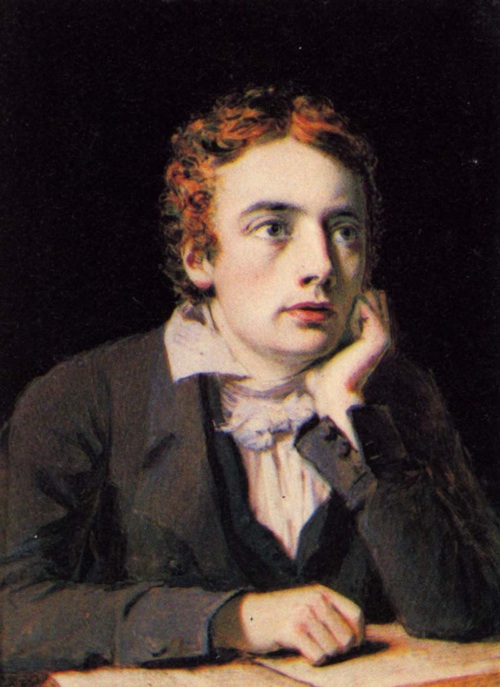Long, not wholly successful pastoral romantic mini-epic, apparently conceived as a more ambitious work than the execution proved it to be. Keats's miracle year of course was the next year, 1819, so the significance of Endymion, which was pulverized by the critics upon its first appearance, mortally wounding, some claim, the sensitive poet, lies largely in its relation to the more celebrated poems which very closely followed upon it rather than strictly on its own merits. It has a famous opening: "A thing of beauty is a joy for ever:/Its loveliness increases; it will never/Pass into nothingness," etc. It is skillful, perhaps overly dreamy, the narrative is difficult to follow and conceive of as a whole. It is neither a solid world that is created therein, nor a vivid (living) one. The quest is not heroic enough, the observation not exquisite enough, for a work of high power. That Keats did go on to become, for a period lasting about 8 months or so anyway, a legitimately great poet at a very young age, would not, I think, have been anticipated by anyone reading this. He was 22 when this was published, and while there is evidence of some talent, he had not yet figured out either how to curb his exuberance, to hone in on specificities rather than abstractions of thought and feeling, or to measure and frame sensations and experiences at something approximating their real value. Most potential writers of course fail to get a handle on these secrets before that exuberance, and the greater part of whatever talent they may have had, have been exhausted or have abandoned them.
 The poem above all is a celebration of a comfortable, soft and idle life that appeals to many well-intentioned but misguided young people of a romantic bent. I was such a young person myself; I hated working and thought it would be the height of living to loll about in cafes and bars until 3am every night, get up at eleven, take a walk in a European-type city or go to the cinema or some art gallery in the afternoon, write in the evenings, go out for dinner and an evening of revelry around 9. Women of course, but bohemian-style affairs, numerous and of short duration. Other observations:
The poem above all is a celebration of a comfortable, soft and idle life that appeals to many well-intentioned but misguided young people of a romantic bent. I was such a young person myself; I hated working and thought it would be the height of living to loll about in cafes and bars until 3am every night, get up at eleven, take a walk in a European-type city or go to the cinema or some art gallery in the afternoon, write in the evenings, go out for dinner and an evening of revelry around 9. Women of course, but bohemian-style affairs, numerous and of short duration. Other observations:Beauty compensates for everything ("despondence...the inhuman dearth/Of noble natures...the gloomy days...all the unhealthy and o'er-darkened ways").
The idea of "binding", boundaries and the like, applied to bodies, souls, realms of the firmament, etc, is repeated numerous times in the poem.
Notes on selected lines: The languidness!--So lush. So romantic. So unreal.--A pleasant, good verse, if a bit airy.--Lovely images, but what do they mean?--In images luxuriant like a rococo painting.
This rhyme drew a laugh: "Aye, even as dead still as a marble man/Frozen in that old tale Arabian." Endymion himself is being referred to here.
The introduction of the Endymion character was confusing to me. I am pretty sure I missed something.
 We are helped to see better. One of reasons for reading pastoral poetry.
We are helped to see better. One of reasons for reading pastoral poetry.These lines drew both a laugh and a reminiscence of Spenser:
"There hollow sounds arous'd me, and I sighed
To faint once more by looking on my bliss--
I was distracted; madly did I kiss
The wooing arms which held me, and did give
My eyes at once to death..."
This recalled the verse in the Faerie Queene where the idle men wallowing in sensualism have their eyes--or perhaps it was even their brains?--devoured through the eye sockets by the sirens who have lured them to their current sybaritic pass. The image obviously left an impression on me.
Hard to get a sense of what is happening (previously introduced characters that I had entirely forgotten are re-entering the narrative, etc).
These lines I find rather endearing:
"...although 'tis understood
The mere commingling of passionate breath,
Produce more than our searching witnesseth:
What I know not: but who, of men, can tell
That flowers would bloom, or that green fruit would swell
To melting pulp, that fish would have bright mail,
The earth its dower of river, wood, and vale,
The meadows runnels, runnels pebble-stones,
The seed its harvest, or the lute its tones,
Tones ravishment, or ravishment its sweet
If human souls did never kiss and greet?"
I do not know that I can share this view of the nature of existence, but I do think the sentiment has a deal of beauty in it.
Not an alpha male sentiment, and therein, perhaps, the crux of the poem's overall problem:
"...O that she would take my voews,
And breathe them sighingly among the boughs,
To sue her gentle ears for whose fair head,
Daily, I pluck sweet flowerets from their bed,
And weave them dyingly--send honey-whispers
Round every leaf, that all those gentle lispers
May sigh my love onto her pitying!"


No comments:
Post a Comment